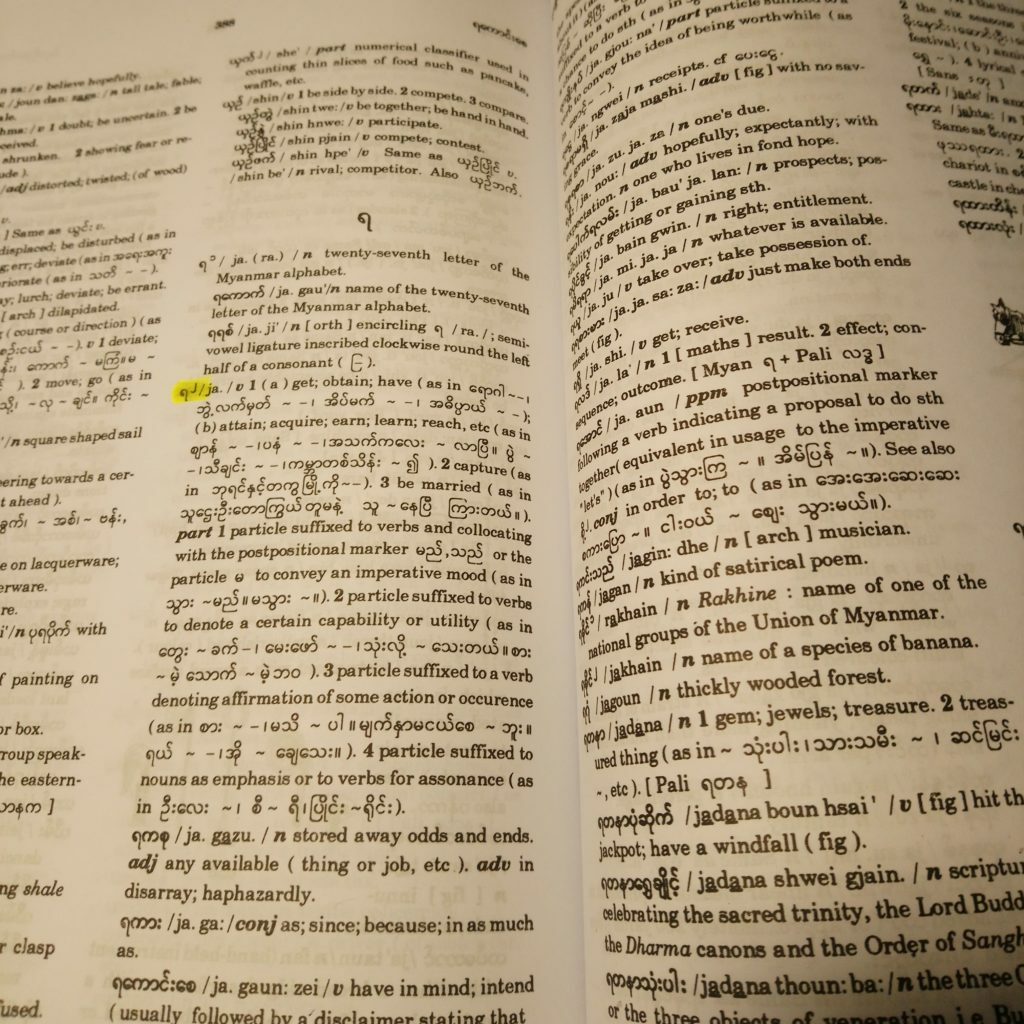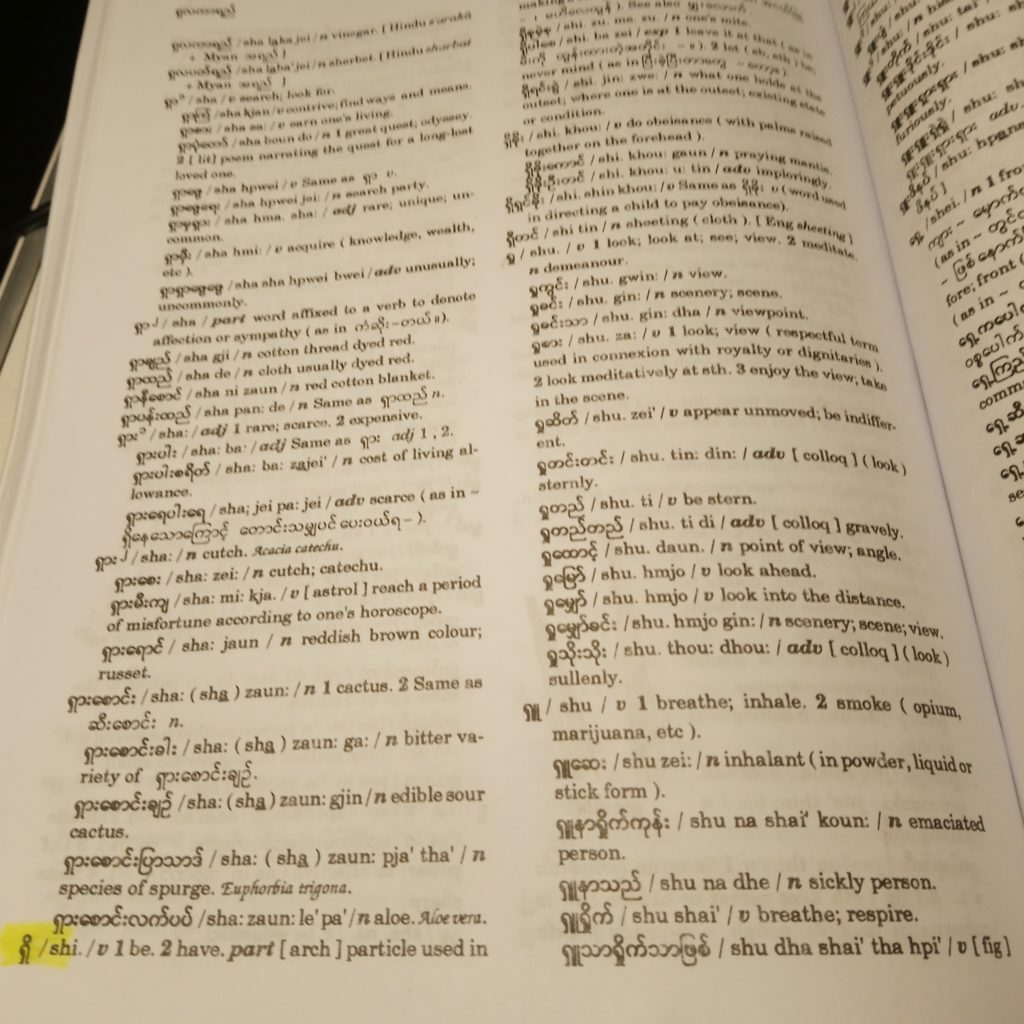Ma.ja.bu: and ma.shi.bu:


In the East, everything matters and nothing goes. In the West, nothing matters and everything goes,
the American writer Philip ROTH (1933-2018) once observed. Because of the rapid economic development in many Asian countries (especially in East Asia), this may no longer apply to all of them today. But in Myanmar it applies 100%.
According to my experience, Burmese are masters at explaining why something is NOT possible. Or impossible. A thousand good reasons, so to speak! But I’m not interested in them! I want to know how to get it done! This attitude can be found not only when it comes to complicated things! Even the simple things are complicated. An example: I want to replace a water hose in my garden: That’s not possible at all! Impossible! At least that’s what my gardener says. And copious explanations follow. When I just do it, the amazement is great!
In every language there are words that foreigners learn first. In German it is supposed to be ‚Scheiße‘ (shit) in all its variations – at least that’s what I’ve been told. In Myanmar it would probably be Mingalaba (actually meaning ‚opportunity‘ or ‚luck‘). The word is mostly used in the sense of ‚Welcome‘ or ‚Good day‘. Apart from that, in my experience the expressions ma. ja. bu: and ma.shi. bu: shall be the ones that foreigners will hear the most. They are the negations of the words shi. (have et al) and ja. (may et al). The prefixes ma and the suffix bu:
indicate negation. They are used in connection with “You can’t do that” or “It’s forbidden” and “That’s not possible” (ma. ja. bu:). Or “We don’t have it” or “It doesn’t exist” (ma. shi. bu:). The Burmese, so I have observed, find an almost perverse delight in explaining to foreigners that something is out of stock. Or why it doesn’t work that way. Or is forbidden. I guess their compatriots have similar problems. If you go into a store and ask about an item, the answer is usually „Ma. shi. bu:“. Here’s an example: I asked an employee at the PRO 1 hardware store in Upper Pazundaung Road in Yangon if they have wood oil: „Ma. shi. bu:“! A closer look proves that it is right in front of his nose on the shelf. Instead, he recommends that I try the Hsemainkoun: building materials wholesale market, about ten miles away. When I rub it right under his nose, he smiles sheepishly. In the department store the same tune. If the salesgirls see a foreigner, their motto seems to be: „Attention foreigner, take full cover!“ and they try to hide. Once you’ve asked them about any article, you can be sure that the answer is ‚Ma. shi. bu:, ma.shi. bu:!. But always with a nice smile! And they won’t let the foreigner down and tell him happily where he might be successful in his search. Only fools follow such a tip. However, if the seller is an Indian, it’s a completely different story! First he’ll try to understand what you want. He might even ask his neighbour for help. And then try to sell it to you. If it is not in stock, he’ll propose another article. Even though that article sometimes is only remotely related to what you want. But he’ll try.

Even more frequently you’ll hear ’ma. ja. bu:’. It’s safe to assume that pretty much everything is forbidden in Myanmar – if you’re foolish enough to ask. I lived in North Dagon for a long time and drove from my house to my downtown office every day. Just like that! If I had gone to the police instead and asked if I was allowed to do that, it would probably have gotten complicated. Perhaps the matter would have to be settled in Naypyidaw. By the Ministry of Immigration. Or I could have gotten away with a small donation. In other words: If you want to do something, don’t ask! Do it! If it is indeed forbidden, you’ll find out rather sooner than later.
With the help of my company, my friend Roman TEUFEL made a very nice film (in my opinion one of the best ever!) about the country: ‘Myanmar – Journey into a lost era’! (see the trailer: https://vimeo.com/40736548). Absolutely worth seeing. In the run-up he asked me about filming permits. I advised not to mess about it and just start filming. Which he did. He came with his small team of four and after two weeks everything was wrapped up. If he had applied for a permit, it would have taken a lot of time and also incurred considerable costs. On another occasion, a team from a German TV station was our customer. And they refused to follow my advice. The result: a horror trip through the Burmese bureaucracy with considerable costs. There must be order! It seems that the German bureaucrats are not much different from their Burmese colleagues …
I think there are two reasons for this: on the one hand the fear of losing face (anade), on the other hand the Burmese tendency to delegate – never take responsibility! As the motto of the Burmese bureaucracy sums it up so nicely: Ma lou‘, ma shou‘, ma pyo‘ – Don’t work, don’t get involved, don’t get fired!
In Western countries we have a saying: The customer is king! He’s the one every shop owner is depending upon. No customers, no business, it’s that simple. So when a foreigner comes to Myanmar he is often disturbed by the widespread lack of customer care – the exception proves the rule. In Myanmar maybe the socialist period has added to this indifference towards customers. Those days you could consider yourself lucky if you got anything at all. It was similar in socialist countries, especially when it came to the service industries. In socialist East German the ‘dictatorship of the proletariat’ was sometimes dubbed as the ‘dictatorship of the plumbers, waiters and taxi drivers’.
So, what to do? In the German speaking countries of Central Europe they have the highly praised ‘dual education system’. It usually lasts three years, before you are considered a fully trained accountant, retail salesman or whatsoever in the commercial sector. In the skilled trades you’ll become a mechanic, craftsman etc. after that period. During that time the apprentice’s salary will be around 20 % of that of a fully trained worker. Four days a week you’ll have to learn the trade on the job, one day at the vocational school. If I’m not mistaken, a German NGO tried to introduce this system here in Myanmar. I doubt this could work in Myanmar where most of the people are poor and dependent on making money as soon as possible. Who would accept being paid, say 80.000 Kyat a month for three years if he/she could make three times
as much in an unskilled profession. Other countries prefer ‘learning by doing’ or ‘training on the job’. And it seems to work, too.
On the other hand: if a company trains her workers there is always the danger that they’ll be running away as soon as they have the impression that they’ve learned enough. The owner of the famous glass factory in Insein once poured his heart out to me. He told me that many workers left after they had acquired the necessary knowhow and started their own business or joined a competitor. Before the Sedona Hotel opened in the mid-90’s the management trained their new workforce for several months. A German friend of mine was in charge of drilling the local staff. The salary was attractive (40 $ a month, if I’m not mistaken), there was free healthcare and a free shuttle service to work and back home. At the same time other hotels (owned by locals) opened, but they didn’t bother to train their staff. My friend told me that the owners of those hotels approached some of the trainees and offered them, say 50 $ a month. And before you could blink, they were gone. Too late did they find out that their new employer didn’t offer the benefits the Sedona was giving. Then of course they wanted to come back. Understandably, their request was turned down. In my experience, many Burmese only look at the short term gains. If you give somebody the choice to either get one dollar today or ten dollars next week most of the people will choose the first option. What would you do?